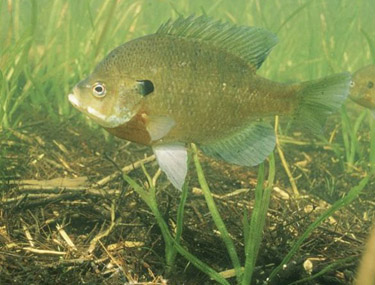Does land use zoning protect ecosystem health?
 Freshwater,
Freshwater,  Policy
Policy  The bluegill (Lepomis macrochirus). Credit, USFWS.Land use zoning—such as requiring a minimum lot size for residential properties—is the most commonly used policy tool in the United States for controlling the number of houses in a rural area. The tool is frequently used to minimize the impact of development on ecosystem health.
The bluegill (Lepomis macrochirus). Credit, USFWS.Land use zoning—such as requiring a minimum lot size for residential properties—is the most commonly used policy tool in the United States for controlling the number of houses in a rural area. The tool is frequently used to minimize the impact of development on ecosystem health.
However, according to a new study looking at lakes in Wisconsin, zoning regulations may sometimes protect ecosystems, but in other situations it may have much less of an effect.
Van Butsic, David Lewis, and Volker Radeloff conducted their study in northern Wisconsin, where more than 1,300 lakes cover almost 15 percent of Vilas County’s surface area. The lakes are a major draw for people who build first or second homes near water’s edge.
Decades ago, the government established zoning regulations to conserve the natural quality of the lakes by controlling housing density, including a 100- or 200-foot minimum lake frontage per lot. Before this study, there was no evidence whether the zoning had its intended effect.
As an indicator of ecosystem health, the scientists chose to focus on growth rate of bluegill fish. Previous studies had found that bluegill growth rate correlates strongly with the amount of coarse woody debris in a lake and that housing density around a lake affects the quantity of coarse woody debris.
For the county as a whole, they found that stricter zoning did lead to lower residential density, higher amounts of coarse woody debris, and higher bluegill growth rates, suggesting that zoning has helped to protect the lake ecosystems.
However, the results were quite variable on a lake-by-lake basis.
Imposing higher minimum shoreline frontage was most effective ecologically for lakes that initially were nearly undeveloped, whereas at lakes that already had fairly dense housing the strict regulations produced little conservation benefit while placing a burden on the landowner.
The big caveat with this study is that it just looked at woody debris and bluegill growth rates, which may only give a partial story of the ecological health of the lakes.
Nevertheless, the study shows that zoning rules should be designed carefully, without a one-size-fits-all approach.
This new study is one of the first to investigate whether zoning does, in fact, support ecosystem health, and if so, in which situations.
The scientists began by using an economic model to simulate how lots in Vilas County would be subdivided under different zoning scenarios, including 100-, 200-, 300-, and 400-foot minimum frontage requirements.
Then they entered the simulated lakeshore development patterns into an ecological model to determine the amount of coarse woody debris and the growth rate of bluegills in each scenario.
Based on the study findings, the authors recommend that “efficient application of zoning must carefully target zoning constraints towards landscapes where it will have significant environmental effects—relatively undeveloped lakes in our application—and avoid placing constraints on landscapes where it will yield minimal gains.”
--by Peter Taylor
Butsic, V., Lewis, D., & Radeloff, V. (2010). Lakeshore zoning has heterogeneous ecological effects: an application of a coupled economic-ecological model Ecological Applications, 20 (3), 867-879 DOI: 10.1890/09-0722.1




Reader Comments